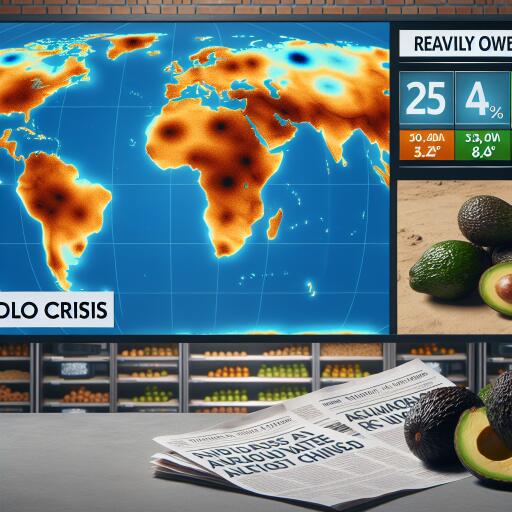
Avocados getting smashed by climate change, report warns
The humble avocado, a staple of brunches and diets around the globe, finds itself on the front lines of the climate change battle, with a stark warning issued about the future of this beloved superfood. Known for its creamy texture, beneficial fats, and versatile use in recipes, the avocado’s existence is threatened by the escalating challenges posed by our changing climate.
Avocados thrive in specific climates, requiring substantial amounts of water, which places them at particular risk in a world grappling with hotter temperatures and increasing drought frequencies. An insightful analysis by Christian Aid highlights the dire situation for avocado production in key regions including Burundi, Chile, Peru, Spain, South Africa, and Mexico. These areas face a significant reduction in cultivation viability, anticipated to drop by 14% to 41% by 2050, with the outcome heavily influenced by our global ability to curb emissions.
Mexico, standing as the globe’s leading avocado producer, is projected to witness a dramatic shrinkage in growth potential of up to 31% by 2050, should global temperatures be maintained below a 2°C increase. However, the scenario darkens with the prospect of a 5°C increase, escalating potential losses to 43%.
“Climate change is a huge problem, especially for avocado growers like us in Burundi,” shares Jolis Bigirimana, an avocado farmer and advocate for sustainable practices within the agricultural community. “We’re faced with soaring temperatures, unpredictable heavy rains, and soil erosion, all of which undermine our productivity and livelihoods.” The economic burden has intensified, with skyrocketing water costs putting additional pressure on growers.
The average avocado demands an astonishing 320 litres of water for its cultivation, a fact that underscores the challenge of growing this crop under climate-induced water scarcity. “The cost of producing avocados is climbing, a trend that promises to make avocados more expensive for consumers,” cautions food sustainability expert Honor Eldrige. This observation signals a looming increase in the price of avocado-based products, directly hitting consumers’ pockets.
Dr. Chloe Sutcliffe, specializing in sustainable horticulture, adds another layer to the avocado crisis. She reflects on the UK’s heavy reliance on imports from Peru and Chile, countries already struggling with acute water shortages partly due to the expansion of avocado farming. These shortages have throttled water access for local farmers and could worsen with the advancing impacts of climate change on water availability.
The shading of light on these pressing issues coincides with public opinion demanding action. A vast majority expresses a desire for governmental intervention to mitigate climate change effects on the food supply chain, emphasizing support for farmers in vulnerable regions.
In response, non-profit organizations are rallying for a global commitment to rapid emission reductions and a push towards renewable energy, alongside financial aid to empower those in the avocado supply chain to adapt to these new realities. “As a cornerstone of their economies, it’s crucial that these farming communities receive the support needed to navigate a changing climate,” urges global advocacy lead, Mariana Paoli.
The call to action extends beyond support – it encompasses a plea for mitigation. “We urge affluent nations, responsible for the lion’s share of emissions, to slash their carbon output and provide financial support for adaptations to climate change,” asserts Bigirimana.
Addressing this issue necessitates a comprehensive approach. “We need to explore and adopt diverse farming systems that move away from environmentally destructive practices such as deforestation and monoculture, which leave crops like avocados more susceptible to disease, deplete soil quality, and exacerbate water scarcity,” recommends Professor Carol Wagstaff, an expert in agricultural resilience practices.
This situation beckons an urgent reevaluation of our agricultural practices and policies to safeguard the future of avocados, emphasizing the broader need for a sustainable and resilient food system capable of withstanding the challenges posed by climate change.





Leave a Reply